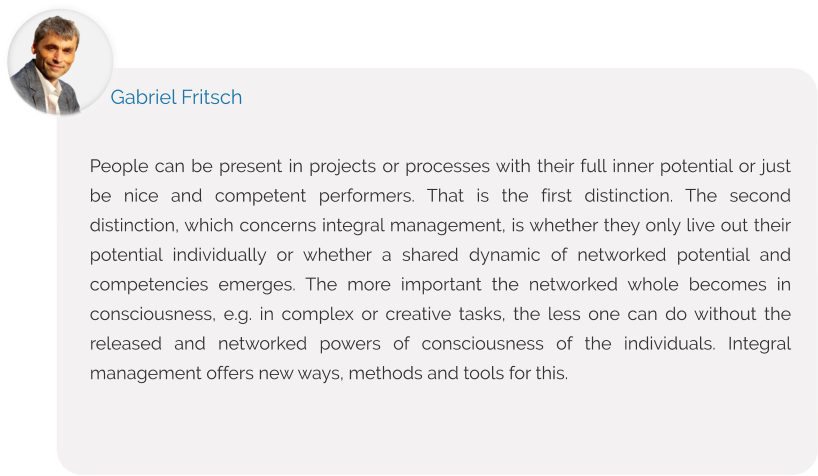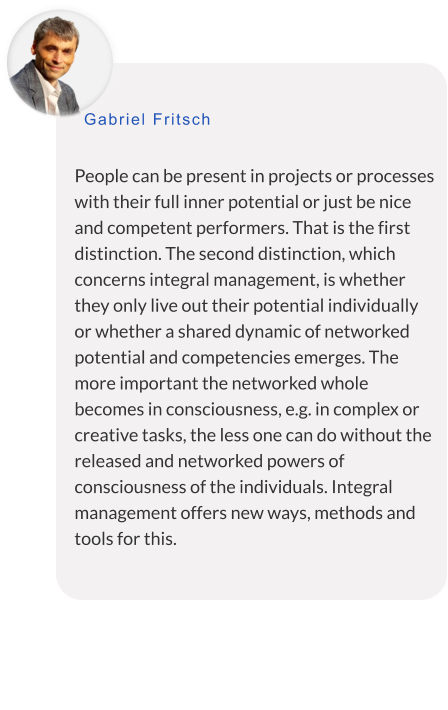Successful
cooperation
is
both
a
path
and
a
goal.
Good
methods
and
tools
make
it
much
easier
for
a
team
to
organize
itself.
Encourage
your
team
to
take
the
first
steps
in
this
direction
and
experience
the difference.

1.
What is integral management?
2.
What are the potential problems?
3.
Which tools and methods are suitable?
4.
How do several teams work together in a self-organized way?
6th hurdle: Bringing integral management to life
WHAT
Integral
management
means
that
one
or
more
teams
manage
themselves.
The
management
of
projects
and
processes,
as
well
as
the
necessary
guidance
and
instruction,
is
carried
out
flexibly,
dynamically
and
up
to
date
by
the
team
and
not
statically
by
individuals
with
hierarchical
supremacy.
The
organic
approach
means
that
not
only
the
team
but
also
its
environment
is
taken
into
account.
This
approach
has
an
empowering
rather
than
frustrating
effect
if
it
is
introduced
at
the
right
time
in
the
right
team
in
such
a
way
that
it
does
not
overburden
the
team
as
a
whole.
A
good
methodical
approach
is
therefore just as important as the willingness of individuals to organize themselves.
Integral
management
is
suitable
wherever
people
actively
work
together,
such
as
in
teams,
start-ups,
companies
and
initiatives.
Partnerships
and
new
housing
projects
can
also
benefit
from
it.
It
is
based
on
the
desire
for
self-determined
cooperation
in
a
generally
caring
attitude.
Genuine
self-organization
goes
back
to
the
self
of
every
active
person.
Therefore,
self-organization
automatically
leads
to
the
empowerment
of
individuals
and
teams.
Integral
management
faces
the
challenge
of
bringing
the
many
different
impulses
of
different
people
together
into
a
cleverly
organized,
joint
movement.
The
power
of
the
individual
should
be
as
high
as
possible
without
becoming
dominant.
The
communication
effort
should
be
as
low
as
possible
and
the
commitment
as
high
as
possible.
This
can
be
achieved
quite
well
through
a
new
approach
to
the
principles
that
work
in
communities.
NVC-plus
now
provides
a
simple
method
for
this.
Within
the
framework
of
NVC-plus,
other
tools can also be used as required.
What can be expected as a result of self-organized teams and companies?
- more purpose, happiness and satisfaction
- more power, flexibility and creativity in the team
- less conflict and internal friction
- faster crisis management
- more decision-making potential right where the tasks are
Here are the four points that are important:
Take
a
look
at
these
four
points
and
discuss
them
with
your
team.
If
you
are
interested
in
this
topic,
sign
up
for
the
newsletter
and
find
out
more
about
NVC-plus
and
the
organic
self-organization of teams and companies.
WHO
HOW

Self-organized
teams
are
the
key
to
organic
or
integral
management.
But
how
can
different
self-
organized
teams
work
together
in
an
agile
way?
How
can
strong
leadership
qualities
come
into
play without the need for specific bosses?
How
can
a
team
or
even
an
entire
company
organize
itself
from
within?
How
can
all
the
different
potentials
of
people
contribute
to
a
common
success
without
interfering
with
each
other?
How
can
the
whole
be
far
more
than
the
sum
of
its
parts?
The
answer
is
integral
management
with
NVC-
plus.

How to turn your team
into the boss


- The 6 Hurdles
- The Elements
- What are the Elements
- Culture Stage Model
- Gut, Head or Herart Process
- Culture Change
- List of Feelings and Needs
- Emergency Emo-Step
- Four Step Circle
- NVC Magic Circle
- Utopia Magic Circle
- Utopia and Vision
- No-Goes and Must-Haves
- Pain Points
- Consensus
- Requirement Lists
- NVC-plus Strategy
- NVC-plus Matrix
- Discourse
- Card Set
- Download-Tool-Depot
- FAQs
- Events
- Media

6 Hurdles to Self-Organization
Chapter 25 - Integral Management

Home / hurdle 6: integral management /



Every team, start-up, or company must overcome these six hurdles if it wants to organize itself
collegially in order to successfully manage projects from within the community.
1. Operating principles of integral management
2. StrategyMap
3. NVC-plus Matrix
4. Discourse
Integral
management
means
that
one
or
more
teams
manage
themselves.
The
management
of
projects
and
processes,
as
well
as
the
necessary
guidance
and
instruction,
is
carried
out
flexibly,
dynamically
and
up
to
date
by
the
team
and
not
statically
by
individuals
with
hierarchical
supremacy.
The
organic
approach
means
that
not
only
the
team
but
also
its
environment
is
taken
into
account.
This
approach
has
an
empowering
rather
than
frustrating
effect
if
it
is
introduced
at
the
right
time
in
the
right
team
in
such
a
way
that
it
does
not
overburden
the
team
as
a
whole.
A
good
methodical
approach
is
therefore
just
as
important
as
the
willingness
of
individuals to organize themselves.
Integral
management
is
suitable
wherever
people
actively
work
together,
such
as
in
teams,
start-ups,
companies
and
initiatives.
Partnerships
and
new
housing
projects
can
also
benefit
from
it.
It
is
based
on
the
desire
for
self-determined
cooperation
in
a
generally
caring
attitude.
Genuine
self-organization
goes
back
to
the
self
of
every
active
person.
Therefore,
self-
organization
automatically
leads
to
the
empowerment of individuals and teams.
Integral
management
faces
the
challenge
of
bringing
the
many
different
impulses
of
different
people
together
into
a
cleverly
organized,
joint
movement.
The
power
of
the
individual
should
be
as
high
as
possible
without
becoming
dominant.
The
communication
effort
should
be
as
low
as
possible
and
the
commitment
as
high
as
possible.
This
can
be
achieved
quite
well
through
a
new
approach
to
the
principles
that
work
in
communities.
NVC-plus
now
provides
a
simple
method
for
this.
Within
the
framework
of
NVC-plus,
other
tools
can
also
be
used
as
required.
What
can
be
expected
as
a
result
of
self-
organized teams and companies?
- more purpose, happiness and satisfaction
-
more
power,
flexibility
and
creativity
in
the
team
- less conflict and internal friction
- faster crisis management
-
more
decision-making
potential
right
where
the tasks are
Here are the four points that are important:
Take
a
look
at
these
four
points
and
discuss
them
with
your
team.
If
you
are
interested
in
this
topic,
sign
up
for
the
newsletter
and
find
out
more
about
NVC-plus
and
the
organic
self-
organization of teams and companies.




1.
What is integral management?
2.
What are the potential problems?
3.
Which tools and methods are suitable?
4.
How do several teams work together in
a self-organized way?
WHAT
WHO
HOW

Self-organized
teams
are
the
key
to
organic
or
integral
management.
But
how
can
different
self-organized
teams
work
together
in
an
agile
way?
How
can
strong
leadership
qualities
come
into play without the need for specific bosses?
How
can
a
team
or
even
an
entire
company
organize
itself
from
within?
How
can
all
the
different
potentials
of
people
contribute
to
a
common
success
without
interfering
with
each
other?
How
can
the
whole
be
far
more
than
the
sum
of
its
parts?
The
answer
is
integral
management with NVC-plus.

Quick Start
Integral Management

Chapter 25 - Integral Management


- The 6 Hurdles
- The Elements
- What are the Elements
- Culture Stage Model
- Gut, Head or Herart Process
- Culture Change
- List of Feelings and Needs
- Requirement Lists
- NVC Magic Circle
- Utopia Magic Circle
- Emergency Emo-Step
- Four Step Circle
- Utopia and Vision
- No-Goes and Must-Haves
- Pain Points
- Consensus
- NVC-plus Strategy
- NVC-plus Matrix
- Discourse
- Card Set
- Download-Tool-Depot
- FAQs
- Events
- Media
Successful
cooperation
is
both
a
path
and
a
goal.
Good
methods
and
tools
make
it
much
easier
for
a
team
to
organize
itself.
Encourage
your
team
to
take
the
first
steps
in
this
direction
and
experience
the
difference.

1. Operating principles







































